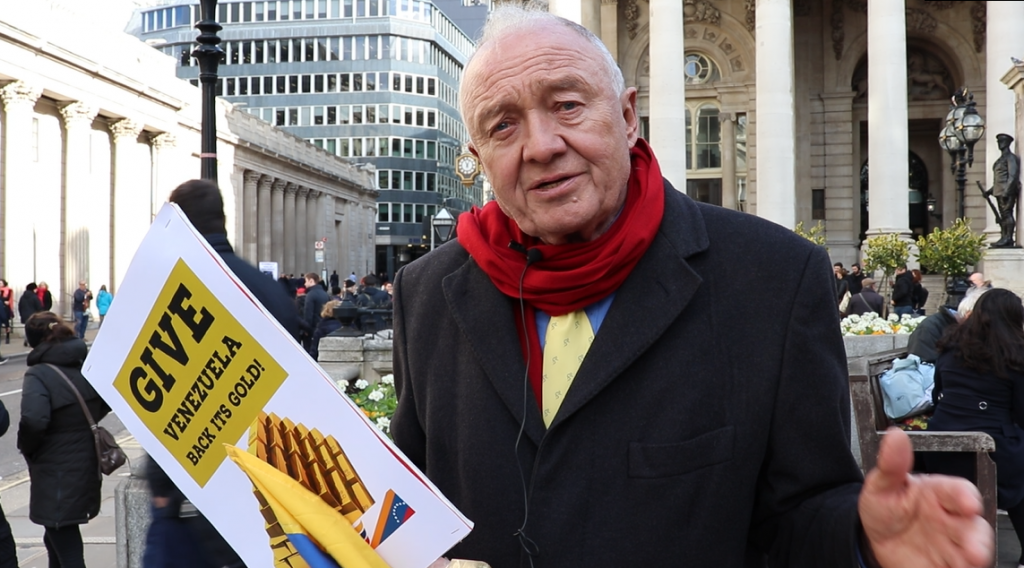We need to step up our campaign against the illegal US sanctions on Venezuela, writes KEN LIVINGSTONE
AN overwhelmingly damning report by UN special rapporteur on
human rights Alena Douhan has catalogued the massive harm inflicted on
the Venezuelan people by the illegal sanctions imposed primarily by the
US but also by Britain, the EU and Canada.
Yet less than a month after its publication in February, President
Joe Biden has chosen to renew by executive order what the Obama
administration in 2015 termed “a national emergency with respect to the
situation in Venezuela,” on the absurd grounds that the country
continues “to pose an unusual and extraordinary threat to the national
security and foreign policy of the United States.”
The special rapporteur’s interim report, based on first-hand
observations and extensive discussions with a wide range of
stakeholders, makes a number of critical points about the sanctions.
At its heart is an unequivocal statement that the unilaterally imposed sanctions violate international law.
With a wealth of detail, it makes the case that since 2017 the
coercive measures issuing from Washington have completely debilitated
the Venezuelan economy.
The government’s revenue has shrunk by 99 per cent, leaving the
country currently living on 1 per cent of its pre-sanctions income,
massively degrading the quality of life of the population.
The report recognises that the government has sought to address
structural problems in the economy but concludes that “the hardening of
sanctions faced by the country since 2015 undermines the potential
positive impact of the current reforms as well as the state’s capacity
to maintain infrastructure and implement social projects.
“Today, Venezuela faces a lack of necessary machinery, spare parts, electricity, water, fuel, gas, food and medicine.”
Among the report’s recommendations, it urges “the governments of the
United Kingdom, Portugal and the United States and the corresponding
banks to unfreeze the assets of the Central Bank of Venezuela (BCV) to
acquire medicines, vaccines, food, medical and other equipment, spare
parts and other essential goods to guarantee the humanitarian needs of
the people of Venezuela and the restoration of public services.”
In doing so, the report echoes other high-level calls for the sanctions to be suspended during the pandemic or lifted outright.
In March 2020 UN secretary-general Antonio Guterres called for the
waiving of sanctions, saying: “This is the time for solidarity not
exclusion.”
The Pope has also appealed for an end to sanctions preventing countries from “providing adequate support to their citizens.”
But Biden and his Secretary of State Antony Blinken appear to be
committed to key elements of the Trump administration policy of “regime
change”: maintaining the blockade, demonising President Nicolas Maduro
as a “dictator” to delegitimise the elected government, bankrolling
internal destabilisation and supporting the fraudster Juan Guaido as
“interim president.”
Following the elections for a new national assembly in December 2020,
former deputy Guaido no longer has any elected position, since he led
his supporters in a boycott of the election.
But not all opposition parties signed up to this, opting instead to
contest assembly seats — even though they were threatened with sanctions
by the US for their temerity in doing so.
As a result, there is now in the assembly a small but significant
number of opposition members supporting self-determination and national
sovereignty, leaving the increasingly discredited Guaido and motley
extreme right-wing forces outside the assembly wedded to support for US
sanctions and US-backed “regime change.”
Further fragmentation of the anti-Chavista opposition is evident in
former presidential candidate Henri Falcon’s condemnation of Guaido’s
tactic of boycotting the assembly elections and the criticism of Guaido
by Henrique Capriles, also a former presidential candidate, as an
ineffective leader.
For now, Guaido is still being supported by the US (and Britain)
despite his involvement in serial coup attempts, repeated calls to the
military to oust Maduro and mounting evidence of corruption in his camp.
The European Union, though, no longer recognises Guaido as
Venezuela’s “interim president” after he stood down as an assembly
member and had no further claim to be its head, but it is still refusing
to accept the December assembly elections as legitimate.
Guaido’s reputation will not be enhanced internationally by his
hard-line stance opposing the UN special rapporteur’s support for the
Venezuelan government’s proposal for part of the more than $1.8 billion
worth of Venezuelan assets frozen by the Bank of England to be used to
purchase $120 million worth of Covid-19 vaccines.
Meanwhile, Venezuela is tackling the pandemic as best it can, given
that the US blockade is severely restricting its ability to buy
necessary medical supplies.
Were it not for the assistance of China, Russia, Turkey and agencies
of the United Nations, Foreign Minister Jorge Arreaza has explained,
Venezuela would not even have the vaccine, PCR tests, ventilators or
masks.
This makes the task of opposing the blockade all the more urgent. Now
more than ever it is vital to step up our expressions of international
solidarity with Venezuela in defence of their national sovereignty and
to make it clear that sanctions are illegal, unjustifiable and
unacceptable.
We must urge the US and British governments, and the EU, to lift all
sanctions and engage constructively with the elected Venezuelan
government.
Sign the Venezuela Solidarity Campaign petition against the US’s illegal sanctions on Venezuela at bit.ly/stopvenezuelasanctions.
Follow Ken at www.twitter.com/Ken4London and www.facebook.com/KenLivingstoneOfficial.
This article originally appeared in The Morning Star

